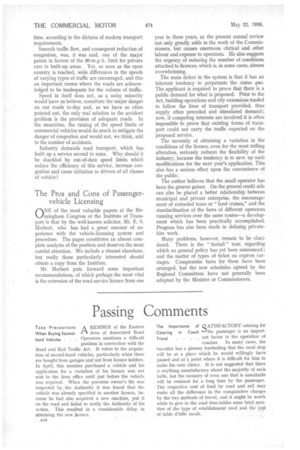The Pros and Cons of Passengervehicle Licensing
Page 26

If you've noticed an error in this article please click here to report it so we can fix it.
ONE of the most valuable papers at the Birmingham Congress of the Institute of Transport is that by the well-known solicitor, Mr. E. S. Herbert, who has had a great amount of experience with the vehicle-licensing system and procedure. The paper constitutes an almost complete analysis of the position and deserves the most careful attention. We include a résumé elsewhere, but really those particularly interested should obtain a copy from the Institute.
Mr. Herbert puts forward some important recommendations, of which perhaps the most vital is the extension of the road service licence from one year to three years, as the present annual review not only greatly adds to the work of the Commissioners, but causes enormous clerical and other labour and expense to operators. He also suggests the urgency of reducing the number of conditions attached to licences, which is, in some cases, almost overwhelming.
The main defect in the system is that it has an inherent tendency to perpetuate the status quo. The applicant is required to prove that there is a public demand for what is proposed. Prior to the Act, building operations and city extensions tended to follow the lines of transport provided, thus supply often preceded and stimulated demand ; now, if competing interests are involved it is often impossible to prove that existing forms of transport could not carry the traffic expected on the proposed service.
The necessity of obtaining a variation in the conditions of the licence, even for the most trifling alteration, seriously reduces the flexibility of the industry, because the tendency is to save up such modifications for the next year's application. This also has a serious effect upon the convenience of the public.
The author believes that the small operator has been the greater gainer. On the general credit side can also be placed a better relationship between municipal and private enterprise, the encouragement of extended tours or " land cruises," and the standardization of the fares of different operators running services over the same routes—a development which has been practically accomplished. Progress has also been made in defining privatehire work.
Many problems, however, remain to be elucidated. There is the " fantail " tour, regarding which no general policy has yet been announced ; and the matter of types of ticket on express carriages. Compromise fares for these have been arranged, but the new schedules agreed by the Regional Committees have not generally been adopted by the Minister or Commissioners.




















































































